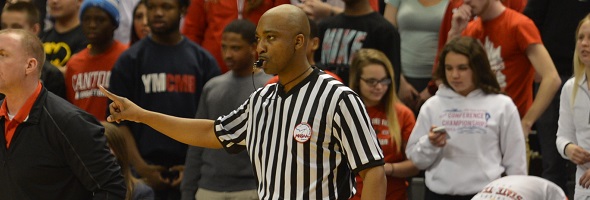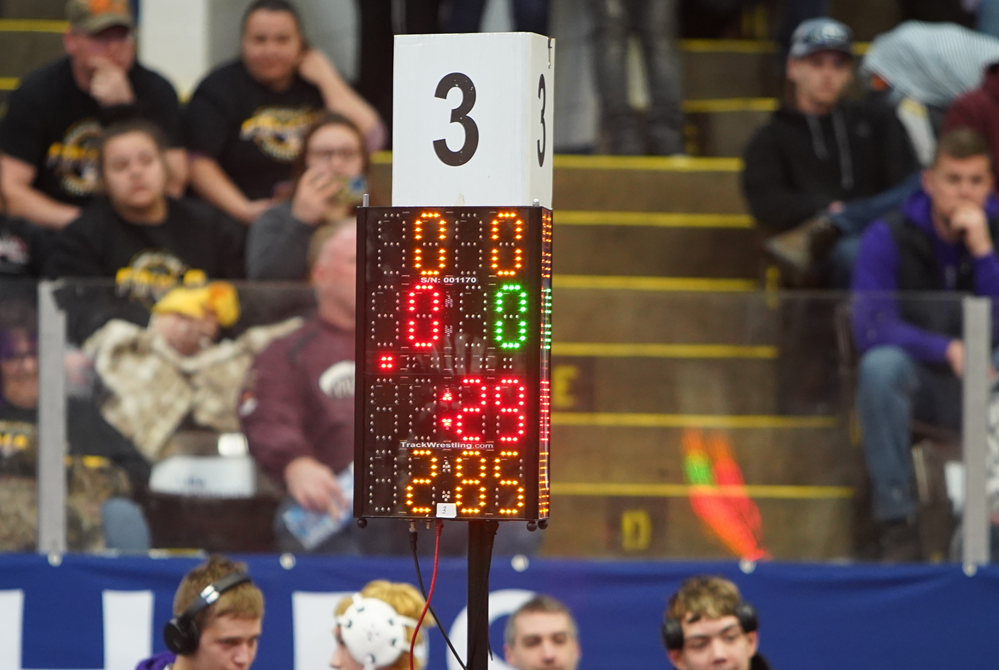
Be the Referee: Block/Charge Calls
March 29, 2016
This week, MHSAA assistant director Mark Uyl explains what is often considered the most difficult call to make in all of sports officiating.
Be The Referee is a series of short messages designed to help educate people on the rules of different sports, to help them better understand the art of officiating, and to recruit officials.
Below is this week's segment - Block/Charge - Listen
It’s often been said that the most difficult call to make in all of sports officiating is the block/charge in basketball.
When you’re watching your next basketball game, the key for the official in getting the play correct is determining whether or not the defender gets in a legal guarding position. Many times we’ll hear announcers and commentators talk about the defender having his feet planted and stationary; that actually isn’t required by the rule. The rules require the defender to be in a legal guarding position, which is a position where it’s facing the offensive player and they’ve established a position in advance of the offensive player.
If the defender is in illegal position, the contact is now a charge.
Past editions:
March 10: Ball Stuck on the Rim - Listen
March 3: Three Seconds - Listen
Feb. 25: Deciding the Game - Listen
Feb. 18 : Cheer Safety - Listen
Feb. 11: Primary Areas - Listen
Feb. 4: Block/Charge Calls - Listen
Jan. 28: Dive on the Floor - Listen
Jan. 21: Hockey Officials' Options - Listen
Jan. 14: Recruiting Officials - Listen
Jan. 7: Wrestling Weight Monitoring - Listen
Dec. 31: Respect for Referees - Listen
Dec. 24: Basketball Instant Replay - Listen
Dec. 17: Basketball Communication - Listen
Dec. 10: Basketball Excessive Contact - Listen
Nov. 26: Pregame Communication - Listen
Nov. 19: Trick Plays - Listen
Nov. 12: 7-Person Football Mechanics - Listen
Nov. 5: Make the Call: Personal Fouls - Listen
Oct. 29: Officials Demographics - Listen
Oct. 15: Make the Call: Intentional Grounding - Listen
Oct. 8: Playoff Selection - Listen
Oct. 1: Kick Returns - Listen
Sept. 24: Concussions - Listen
Sept. 17: Automatic First Downs - Listen
Sept. 10: Correcting a Down - Listen
Sept 3: Spearing - Listen
Aug. 27: Missed Field Goal - Listen

Be the Referee: Wrestling Tiebreakers
By
Paige Winne
MHSAA Marketing & Social Media Coordinator
January 30, 2024
Be The Referee is a series of short messages designed to help educate people on the rules of different sports, to help them better understand the art of officiating, and to recruit officials.
Below is this week's segment – Wrestling Tiebreakers - Listen
A wrestling dual is tied after 14 matches. What happens? How is a winner determined?
There are 17 possible criteria used to break ties, starting with advancing the team penalized the fewest number of team points for flagrant misconduct or unsportsmanlike conduct.
The 17th and final tie-breaker, if needed, is a simple coin flip.
But how often are these steps actually used? A regular-season dual meet last week went to the seventh tie-break. And in the 2017 Division 3 Finals, Richmond beat Dundee for the state championship by going to the eighth step in the tie-breaker procedure. Richmond had scored more total first points and was crowned the winner.
Previous Editions
Jan. 23: Wrestling Technology - Listen
Jan. 9: 3 Seconds - Listen
Dec. 19: Unsuspecting Hockey Hits - Listen
Dec. 12: No More One-And-Ones - Listen
Nov. 21: Football Finals Replay - Listen
Nov. 14: Volleyball Unplayable Areas - Listen
Nov. 7: Pass/Kick Off Crossbar - Listen
Oct. 31: Cross Country Interference - Listen
Oct. 24: Soccer Overtime - Listen
Oct. 17: Tennis Spin - Listen
Oct. 10: Blocked Kick - Listen
Oct. 3: Volleyball Double & Lift - Listen
Sept. 26: Registration Process - Listen
Sept. 20: Animal Interference - Listen
Sept. 13: Feet Rule on Soccer Throw-In - Listen
Sept. 6: Volleyball Jewelry - Listen
Aug. 30: Football Rules Similarities - Listen
Aug. 23: Football Rules Differences - Listen

